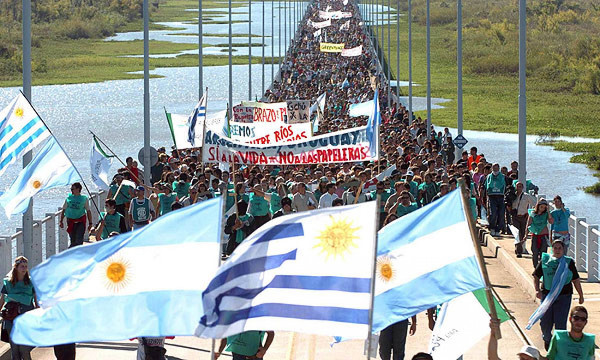Paper Cuts: How A Paper Mill Is Ruining Relations Between Argentina And Uruguay

Argentina and Uruguay’s traditional relationship can safely be called fraternal. And that's not just because they share a language, border, many cultural traits and longstanding economic closeness: They also behave like two siblings who cannot stop fighting. The last quarrel, though, seems to be about to break their fundamentally cordial relationship. The decision of Uruguay to increase production at a paper mill right by the border has made Argentina go ballistic, arguing that it should have been consulted first.
Argentine Foreign Minister Héctor Timerman, who earlier this month called the decision an “attack on Argentina’s national sovereignty” and “a violation on the treaties between both countries,” has toned down his rhetoric. In a statement released Monday, the government has formally asked Uruguay to halt the production increase at the paper mill, seen as polluting by the Argentines, until negotiations are finished, reported Argentine news agency Télam.
Uruguayan President José Mujica has assured that the plant will not be closed, and that he would not stand for any threats from Argentina. “Ultimatums are only given by God,” he said, according to Uruguayan newspaper El País.
Uruguay is outraged that it even needs to give any sort of explanation to Argentina, and accuses the much larger country of wanting to stifle a smaller neighbor that has always been open to dialogue. “This is a united opinion, all the parties concur,” said Pablo Mieres, from the Partido Independiente (Independent Party, currently in the opposition): Argentine President Cristina Fernández de Kirchner, he said, "has started a political movement that reads well-intentioned actions as weaknesses.”
Timerman responded by saying that “Argentina has asked several times for the decision to be put on hold until we discuss the environmental implications, but there has been no response from Uruguay.” The minister, who threatened to bring the issue to the International Criminal Court in The Hague, said his government would wait for “a couple of days” before taking any action.
The conflict over the paper mill, which dates back to 2006, picked up in late September, when Mujica gave the green light to Finnish manufacturer UPM-Kymmene (HEL:UPM1V) to increase production by 10 percent, bringing it up to 1.1 million tons a year.
The cellulose plant is located in the town of Fray Bentos, separated from Argentina by the river Uruguay and 2 km (1.2 miles). Argentina claims that its town of Gualeguaychú, a tourist destination on the other side of the river, is suffering from the pollution generated by the factory, which would harm the flow of visitors and put in jeopardy the main income source of the town.
The Uruguayan government ran a test on the waters of the river, and determined that the plant was producing 5 milliliters of phosphorus per liter of water, 246 percent below the amount considered toxic. UPM has also assured it would install a water purification plant.
The plant is a huge part of the Uruguayan economy, and has increased the country's GDP by 1.6 percent, according to UPM. It also employs 850 people directly, almost all Uruguayans, and creates some 3,500 indirect jobs.
Both sides fear the conflict could lead to closing the bridge Libertador General San Martín between the two countries. The bridge was already closed between 2006 and 2010 because of the first controversy over the mill, causing economic damage to both countries.
© Copyright IBTimes 2024. All rights reserved.





















